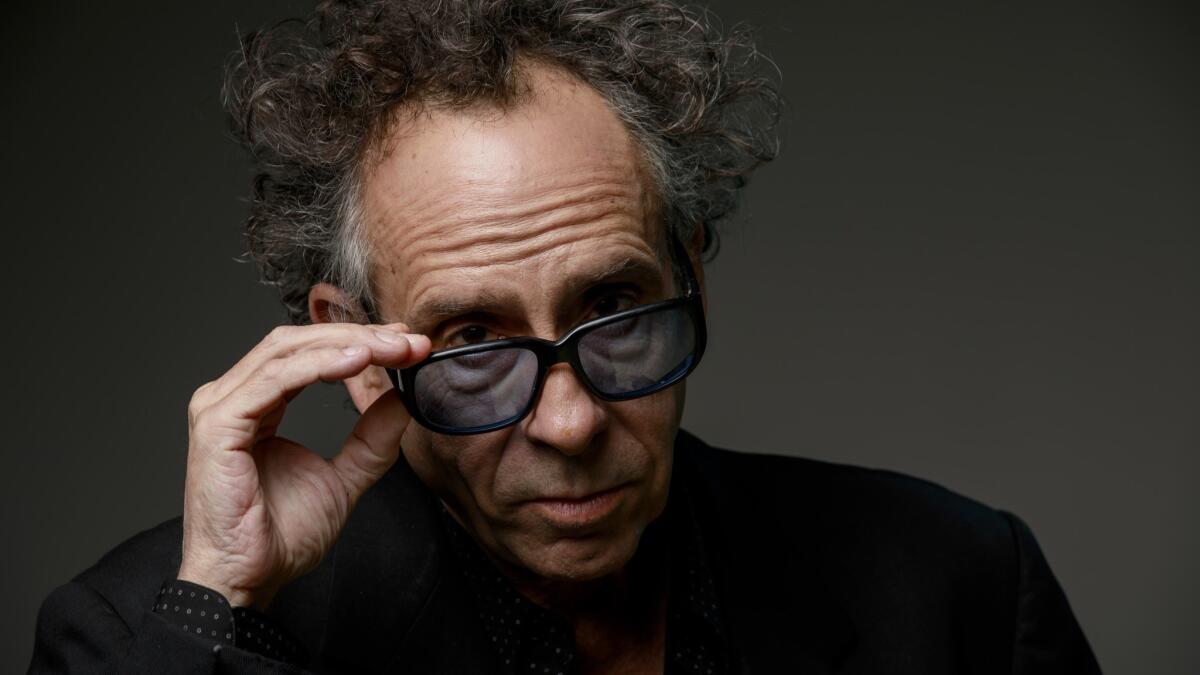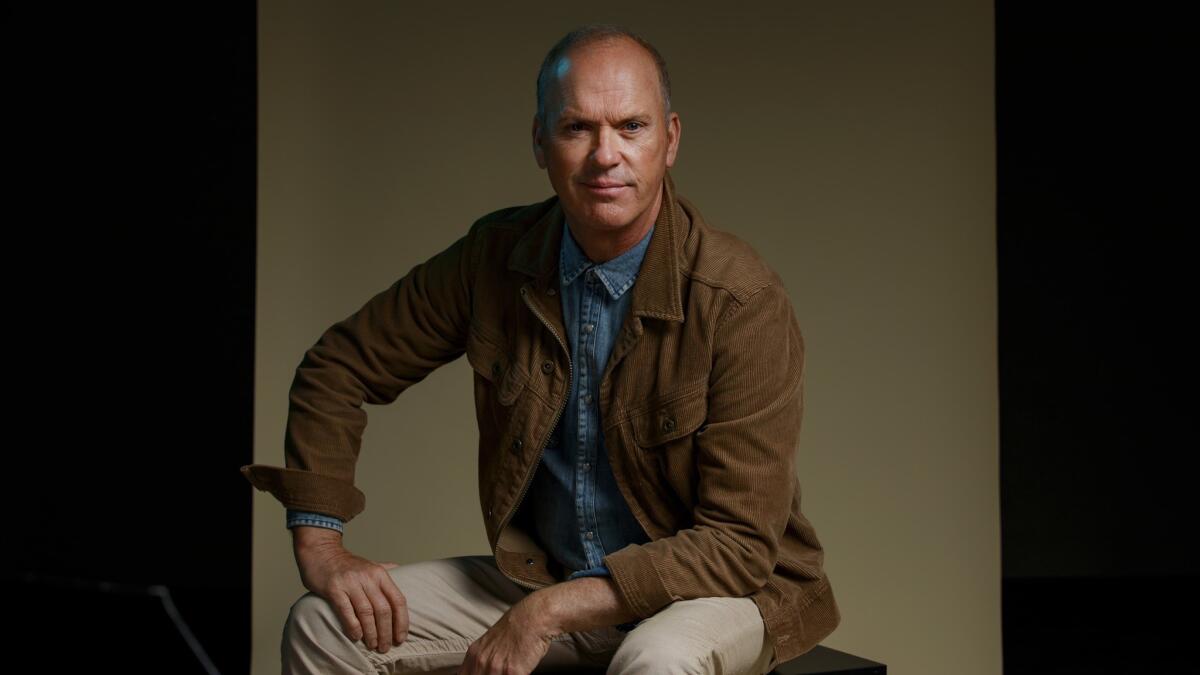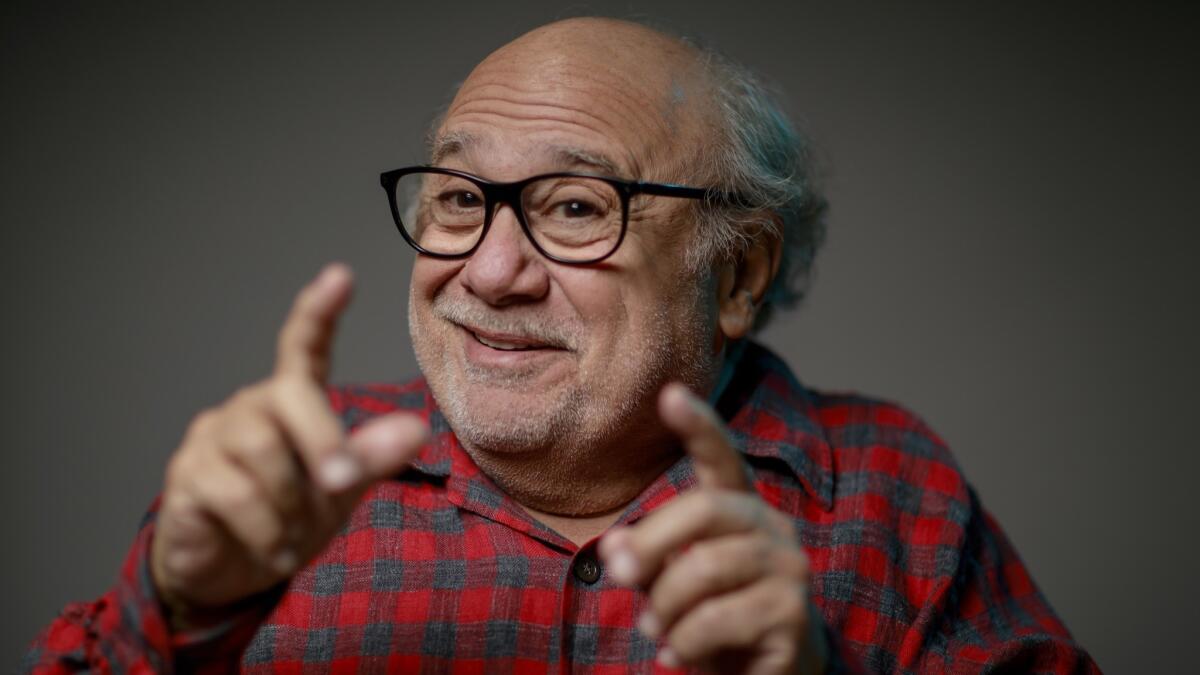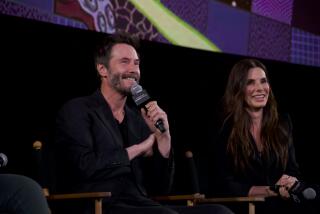Tim Burton’s ‘Dumbo’ isn’t your grandfather’s Disney classic

- Share via
Despite what you might imagine, Tim Burton has never cared for circuses.
Sure, many of Burton’s films — from “Pee Wee’s Big Adventure” to “Beetlejuice” to “The Nightmare Before Christmas” to “Charlie and the Chocolate Factory” — have featured the same blend of fantasy, whimsy and visual spectacle one finds under the big top. And, yes, the circus is the setting of his latest movie, a live-action re-imagining of the much-loved 1941 Disney animated film “Dumbo” that will hit theaters March 29. But actual circuses have never been his thing.
“It’s funny, but I truly never liked the circus,” Burton, 60, said on a recent afternoon, clad from head to toe in black and radiating an impish, hyper-caffeinated vibe. “You’ve got animals being tortured, you’ve got death-defying acts, and you’ve got clowns. It’s like a horror show. What’s to like?”
There is one thing Burton does appreciate about the circus, though: the idea that it represents a thrown-together family of oddballs. “This idea of feeling weird and wanting to join this mixed family of misfits and weirdos — that’s sort of the appeal of it,” said Burton, who, over the years, has created his own rotating circus of collaborators, several of whom — including Michael Keaton, Danny DeVito and Eva Green — star in “Dumbo.” “Making films is a dysfunctional family. That was the lure of the circus for me.”
While the titular giant-eared flying elephant takes center stage in Burton’s “Dumbo,” now as a CGI creation, the underdog pachyderm is placed in an entirely new story, featuring Colin Farrell as a wounded World War I vet who returns to a struggling circus run by DeVito’s ringleader and helps train the baby Dumbo, while Keaton plays a ruthless businessman who tries to exploit the elephant’s special talents for his own ends. The film is just the latest in a string of live-action remakes of Disney animated hits, including 2017’s “Beauty and the Beast,” 2016’s “The Jungle Book” and 2010’s Burton-directed “Alice in Wonderland,” with “The Lion King” due this July.
“When I heard Tim Burton was doing ‘Dumbo,’ I thought, ‘What a gorgeous marriage of material and imagination that would be,’ ” said Farrell. “For 20-plus years now, I’ve been a fan of his. There was an element of wish fulfillment to it. I leapt at the opportunity.”
“The whole movie is very Tim — he understands the heart of the misunderstood, and Dumbo is the perfect example for that,” said Green, who plays a French trapeze artist and has also worked with Burton on 2012’s “Dark Shadows” and 2016’s “Miss Peregrine’s Home for Peculiar Children.” “He was like, ‘Yeah, this is “Dumbo,” but it can’t be too sweet.’ He still wanted an edge and something real, not rainbows and unicorns and all that.”
As a newcomer to Burton’s troupe, Farrell was fascinated to watch the director at work. “He’s very frenetic,” Farrell said. “He’s all over the place, and there are a lot of gestures and unfinished sentences. Every cell in his body vibrates with energy. To give birth to the worlds he’s given birth to — it’s a deep well of creative strength and imagination that he draws from.”
Having appeared in several of those worlds, Keaton and DeVito have a deep familiarity with Burton’s way of working. Both starred in Burton’s 1992 superhero sequel “Batman Returns,” with Keaton as the caped crusader and DeVito as the villainous Penguin. Keaton also played the title character in 1988’s “Beetlejuice,” while DeVito appeared in 1996’s “Mars Attacks!” and 2003’s “Big Fish.”
Along with separate interviews with Farrell and Green, The Times spoke with Burton, Keaton and DeVito about reuniting to re-envision a Disney classic. Despite the more than 25 years that have elapsed since their last collaboration, the three shared an easy, joking rapport, with Burton gently teasing DeVito for having tripped on some stairs at a press conference for the film in Mexico City a few days earlier.
“Break a leg,” Burton said to the actor, deadpan.
“Thank you,” DeVito responded with a laugh. “I told you I always throw myself at the press.”

What were all of your histories with the original “Dumbo”? Was it a movie you remember connecting with as a kid?
DeVito: I’ve seen it a lot. My sisters took me when it played in theaters when I was a kid in Asbury [Park, N.J.]. We had five movie theaters and they used to re-run all kinds of stuff. I’d go to those theaters every weekend. That’s where I first saw “Dumbo.” Then, of course, I have three grandkids, so, over the course of the years, it became one of their favorites.
Keaton: I didn’t have that experience Danny had. I never really knew “Dumbo” from seeing it. It was just kind of like, “Yeah, I know what it is.” I grew up seeing movies on television because we lived fairly far from, like, these little mill towns [in Pennsylvania]. To go to Pittsburgh — there was like one car and seven kids, so there was no way.
Burton: I loved it growing up. But you know, I didn’t love it necessarily as the best movie – I just loved the idea of it. That idea of a character that is weird and doesn’t quite fit in, being taken in by a large family. “Dumbo” felt like it was for people that feel like that. It was a very simple symbol for all of that.
DeVito: We all have that. I mean, I have it big time. When I’d walk into a room, no matter where I was, people would look at me and I’d feel very self-conscious. I felt like a very odd creature-y looking kind of person. I wanted to go behind things, not be seen. And, ironically, the thing that really gave me confidence and a whole other outlook on myself was when I got up on stage in front of people and found this thing that I suddenly loved to do. That was my magic feather. So I relate to that in a big way with “Dumbo.”
Keaton: I always felt like I fit in, and I had a lot of friends. But my friends were as diverse as you could get, therefore, I never felt like I was in a slot and I always felt a little bit outside. Not in a disturbingly bad way, but I think almost everyone has that general feeling.
Michael and Danny, in the years since you first worked with Tim, has he changed a lot or is he pretty much still the same guy?
Keaton: There’s definitely a consistency. From the very first time I worked with him, I thought, ‘This guy sees something — I just have to get on his train.’ However, I will say that what I notice now is he’s calmer. It’s a huge job, and that undertaking is a lot to put on your shoulders, but it never really felt hectic. And I’d forgotten how funny he is.
DeVito: There’s always a certain amount of kinetic artistic energy that’s flowing through him. From the beginning, when I met him on “Batman Returns,” what you noticed is the visual language that he has. I remember his office was filled with these amazing drawings of every character and where he was going with it.
Hanging out with him on the set, I get the feeling that we’re part of his paintbox. He gives you leeway and you can go various ways to give him what colors he wants. But everybody is serving the master that he’s serving. That’s what makes it exciting.
A lot of people probably have an image of Tim as being this tortured, macabre guy based on some of his movies. “Batman Returns,” for one, is a pretty dark movie. Do you think those people would be surprised to see him making a sweet family-friendly movie like “Dumbo”?
DeVito: I guess they might be surprised. But I mean, a lot of people get it right away when he walks into the room. He’s jolly and buoyant.
Burton: Can you help me with this? You bring up a point: People said “Batman” was dark. But, then, half of the people I would talk to about “Batman Returns” would say it was much darker, and half of them would say it’s much lighter. That’s one I don’t understand. [shrugs] I mean, I’m supposed to be the king of darkness, so I should know. But it’s weird.
The original “Dumbo” is one of the first Disney movies a lot of kids see because it’s a very simple sort of fable. But Tim, when I spoke with Eva, she said it was important to you that this version have some edge to it as well.
Burton: Yeah, I mean, it’s already sweet. You can only take so much cute. That’s the reason I think the original movie is so short.
That’s what I liked about this idea when I was presented with it: it tells a parallel story to Dumbo’s about this dysfunctional circus family, this guy who comes back from the war who’s shellshocked and has lost his arm. He’s displaced. His kids are displaced. Everybody is displaced. And the little flying elephant is the symbol of that.

When you’ve done these movies where you’re re-imagining an existing property — whether it’s “Planet of the Apes,” “Charlie and the Chocolate Factory,” “Alice in Wonderland” or now “Dumbo” — do you approach them differently from an original project like, say, “Beetlejuice”?
Burton: Definitely. There’s something perverse about these sorts of challenges. But I didn’t see this like that. When I was first talking about the idea, it was not about, “Oh, we’re doing all these Disney live-action [remakes].” I just liked the idea of it.
Actually, “Dumbo” is probably one of the only original [Disney animated] movies that you can’t remake. The things everybody I know remembers about “Dumbo” are all the politically incorrect things. I mean, you can’t have him getting wasted [like in the original “Pink Elephants on Parade” sequence]. Whenever we talked about “Dumbo,” there’s an elephant in the room there, you know what I’m saying? [laughs]
So there was a certain liberation to say, “You can’t really tick all these boxes.” People’s love of it is not tied into something literal. It’s tied into a feeling that they got from the movie. So it’s a different medium, different story, but we’re trying to have that same feeling.
DeVito: In our new “Dumbo,” you feel all the values that were in the original movie: all the empathy and all the caring and the idea of trusting yourself and nailing the xenophobia. Tim kept all of that but brought it to another level. It’s really great to see that realized.
This interview has been edited and condensed.
Twitter: @joshrottenberg
More to Read
Only good movies
Get the Indie Focus newsletter, Mark Olsen's weekly guide to the world of cinema.
You may occasionally receive promotional content from the Los Angeles Times.











